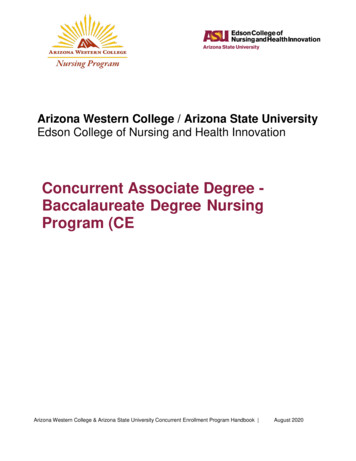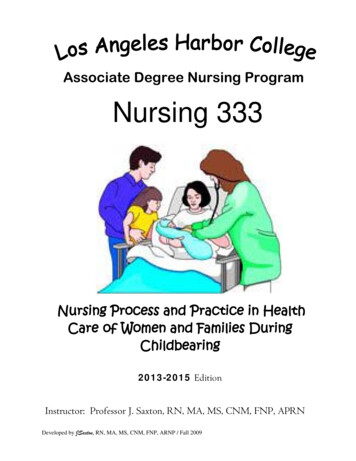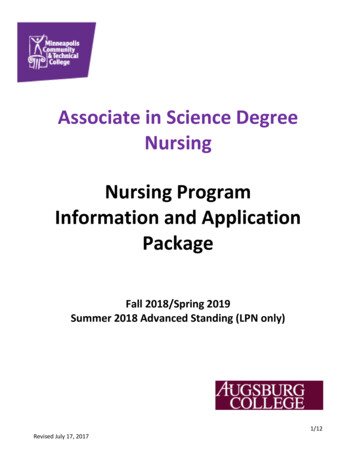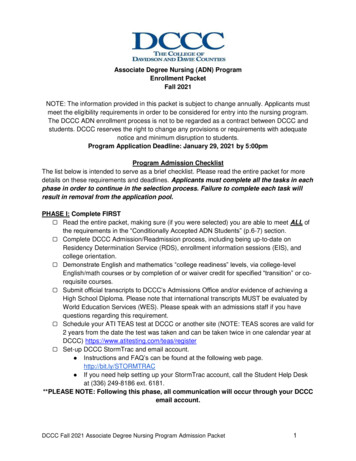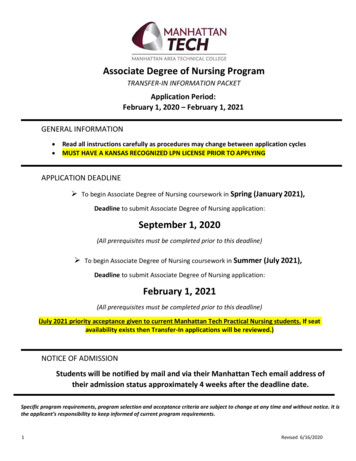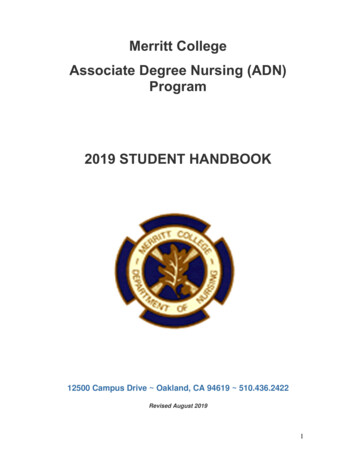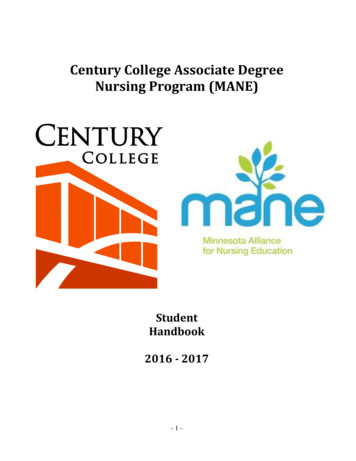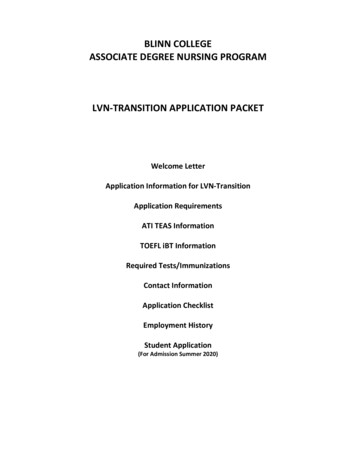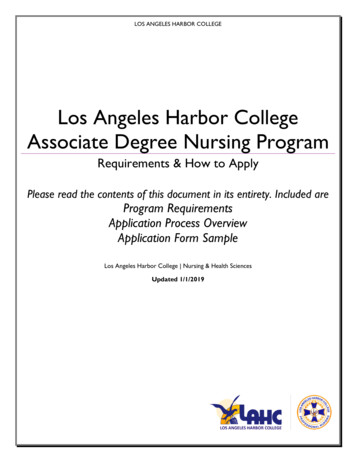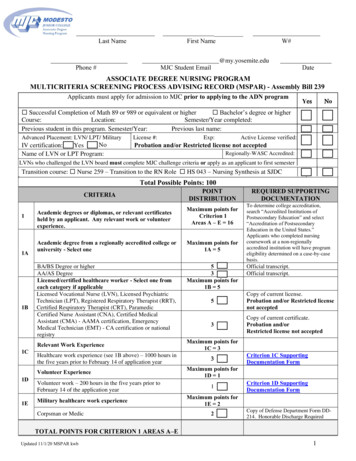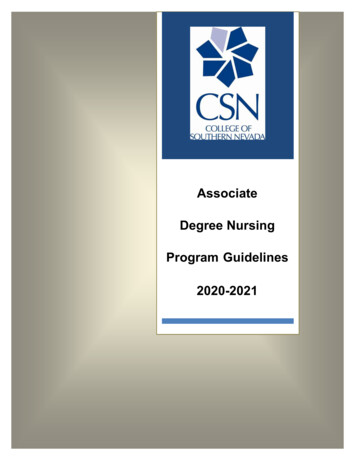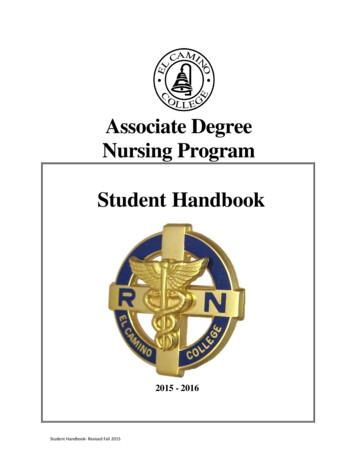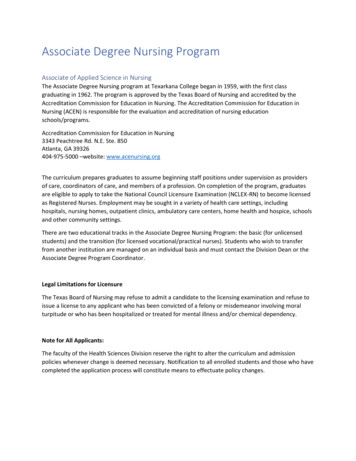
Transcription
Associate Degree Nursing ProgramAssociate of Applied Science in NursingThe Associate Degree Nursing program at Texarkana College began in 1959, with the first classgraduating in 1962. The program is approved by the Texas Board of Nursing and accredited by theAccreditation Commission for Education in Nursing. The Accreditation Commission for Education inNursing (ACEN) is responsible for the evaluation and accreditation of nursing educationschools/programs.Accreditation Commission for Education in Nursing3343 Peachtree Rd. N.E. Ste. 850Atlanta, GA 39326404-975-5000 –website: www.acenursing.orgThe curriculum prepares graduates to assume beginning staff positions under supervision as providersof care, coordinators of care, and members of a profession. On completion of the program, graduatesare eligible to apply to take the National Council Licensure Examination (NCLEX-RN) to become licensedas Registered Nurses. Employment may be sought in a variety of health care settings, includinghospitals, nursing homes, outpatient clinics, ambulatory care centers, home health and hospice, schoolsand other community settings.There are two educational tracks in the Associate Degree Nursing Program: the basic (for unlicensedstudents) and the transition (for licensed vocational/practical nurses). Students who wish to transferfrom another institution are managed on an individual basis and must contact the Division Dean or theAssociate Degree Program Coordinator.Legal Limitations for LicensureThe Texas Board of Nursing may refuse to admit a candidate to the licensing examination and refuse toissue a license to any applicant who has been convicted of a felony or misdemeanor involving moralturpitude or who has been hospitalized or treated for mental illness and/or chemical dependency.Note for All Applicants:The faculty of the Health Sciences Division reserve the right to alter the curriculum and admissionpolicies whenever change is deemed necessary. Notification to all enrolled students and those who havecompleted the application process will constitute means to effectuate policy changes.
Philosophy and Outcomes of the Associate Degree Nursing ProgramTexarkana CollegeThe faculty believes that associate degree nursing education should be an integral part of a communitycollege. We therefore accept the democratic philosophy and objectives of TexarkanaCollege as it fulfills its mission to meet the diverse educational needs of the community. In keeping withthe goals of the college, the associate degree nursing program prepares a graduate for immediateemployment, provides courses that may be acceptable for transfer to other colleges should graduatesseek a higher degree and provides programs for development and/or expansion of skills.We believe that humans are holistic beings who are unique and complex with biological, psychological,sociological and communication needs that vary throughout life. The faculty believes that health,defined as the process of well-being, is the right of every individual. Health services should be availableto each through the cooperative efforts of a wide range of professions and disciplines, commonly calledthe interdisciplinary health team. The inherent dignity of the individual gives one the right to activelyparticipate with the health team in decisions which affect one’s state of health.Nursing works independently as well as collaboratively with other health disciplines to provideindividualistic and cost effective care with clients of all ages. The faculty believes that nursing includesthe promotion of health, prevention of illness, and the care of the ill, disabled, and dying people.Advocacy, promotion of a safe environment, and education are also key nursing roles. (Adapted fromthe International Council of Nurses, 2003). Furthermore, the faculty believes that nursing shouldconstantly encourage client independence.The knowledge base and practice of the nursing profession include promotion of health, managementand monitoring of health and management of common, uncommon, complex and rehabilitativeproblems with predictable and unpredictable outcomes. The knowledge base and practice of theassociate degree nurse is directed toward use of the nursing process to provide or coordinate directnursing care for a limited number of clients with common, complex, or rehabilitative problems instructured acute and long-term health care settings. Such clients are identified as individuals orfamily/significant others.Acute and long-term healthcare settings, for which the graduate is prepared to enter, includegeographical or situational environments where the policies, procedures, and protocols are establishedto support critical thinking decisions, and there is available consultation. The associate degree nursefunctions in accordance with the differentiated essential competencies of graduates of Texas nursingprograms in the role of member of the profession, provider of patient-centered care, patient safetyadvocate, and member of the healthcare team. Upon graduation, the associate degree nurse is preparedfor a beginning staff position under supervision in various healthcare settings.The faculty believes that individuals learn in a variety of ways and come into the learning situation indifferent stages of development; therefore, learning is believed to be:1. Composed of cognitive, affective and psychomotor components.2. An additive process, progressing from simple to complex.3. Demonstrated by a change in behavior.
4. Enhanced by a multi-sensory approach.5. Individualistic, according to life experiences and personal characteristics.As the effort and energy put into learning is under personal control, learning is ultimately theresponsibility of the student. The faculty shares the responsibility to the extent that they areaccountable for curricular planning and for the creation of the learning environment. Throughout thelearning process, the faculty will encourage development of a nursing conscience based uponprofessional, moral, ethical and legal standards.The faculty further believes that as needs of society change, so do learning needs of the professionalswho serve it. Continuing education after graduation is an inherent part of one’s professional obligation.In coordination with existing college continuing education services and with community groups, thenursing faculty responds to learning needs by identifying, planning, and otherwise insuringimplementation of continuing education opportunities for health care personnel.
PROGRAM STUDENT LEARNING OUTCOMES (PSLO)and General Education Core CompetenciesThe following program objectives are the outcomes, which shape the curriculum and are the criteria formeasurement of its success. This reflects the Differentiated Essential Competencies of graduates ofTexas nursing programs as a member of the profession, provider of patient-centered care, patient safetyadvocate and member of the healthcare team. The graduate will:1. Utilize critical thinking skills to provide patient-centered nursing care using evidence-basedoutcomes and the nursing process to accommodate society/cultural differences andcommunicate the same to other members of the healthcare team.2. Demonstrate a personal responsibility to respect a patient’s right to participate in decisionsaffecting their health by promoting patient-centered care and ensuring confidentiality.3. Employ therapeutic communication skills to act as a patient safety advocate by establishingcompassionate, caring and therapeutic relationships in a physically and psychologically safeenvironment.4. Accepts and makes assignments and delegates tasks to other members of the healthcare teamusing empirical and quantitative skills that take into consideration patient safety,organizational policies, and scope of practice and demonstrated abilities.5. Demonstrate professional and social responsibility as an associate degree nurse by assumingresponsibility and accountability for quality of nursing care, maintaining continuedcompetence, adhering to ethical and legal standards and promoting a positive image ofprofessional nursing.6. Serve as an advocate for continuity of care through teamwork and promote quality and accessto healthcare for the patient and family.*Competent is defined as the ability to do; proficient is defined as the ability to do well; andmastery is defined as the ability to do brilliantly at every occasion.Rev. 08.2019
Associate Degree Nursing ProgramAdmission RequirementsBasic Admission ProcedureCandidates for the nursing program are expected to be proficient in communication skills, math, science,computer, and learning skills, as well as have physical and mental abilities to practice nursing. To beconsidered for admission, the candidate must complete the procedures listed below. (Incomplete filesare not considered).Steps for Admission to be completed by the program application deadline (posted to the TC website).1.2.3.4.5.6.7.8.9.10.11.Complete an “Application for Admission” to Texarkana College listing Nursing as your major.A cumulative GPA of 2.5 (on a 4.0 scale) or above on all college-level work.A grade of C or above is required in academic support and nursing courses.TSI met (see advisement staff).A “New Applicant Counseling Interview” form (dated after the first Monday in January). Call theHealth Sciences Division Office to schedule an appointment (903-823-3401).An “overall” score of 60 or greater on the TEAS is required for admission to the program. TheTEAS score must be within 2 years of the program application date. A maximum of three TEASattempts within a 12-month period is allowed. TEAS exam scores taken at proctored testingsites other than Texarkana College may be submitted. A minimum of 15 days is requiredbetween testing attempts to allow for remediation of content. Students may go on-line to payfor and schedule the TEAS test at www.atitesting.com.The student must achieve a score of “proficient” level or greater on the reading portion of theTEAS to be considered for admission.Attend a mandatory information session. Register online or with the Enrollment Specialist (903)823-3351.An official high school transcript, GED score, or transcripts from all colleges attended. Highschool seniors must submit a current transcript with a cumulative GPA of 3.0 (on a 4.0 scale) bythe program application deadline.A current physical examination on the “Nursing Physical Examination” form, negative drugscreen and satisfactory Texas Board of Nursing background check. NOTE: The physical includesproof of childhood immunizations, including a completed Hepatitis B vaccine series (which takesa minimum of 6 months to complete), a meningitis vaccine (unless age 22 or above), as requiredby Texas law, and a TB skin test or negative chest x-ray. This is required after notification inwriting of “Conditional Acceptance” into the nursing program. The applicant must bring proof ofhaving at least begun the Hepatitis B series when completing their interview.American Heart Association Basic Life Support Healthcare Provider course (AHA/BLS/HCP), Mustbe current throughout enrollment in the program. The course must be completed prior toenrollment in RNSG 1413 (Basic Students) and RNSG 1327 (Transition Students). Students areencouraged to take the course after May for the year of acceptance or after the “ConditionalAcceptance” is received to ensure the course is current throughout enrollment. Contact theBusiness and Community Education Office regarding registration for the course.
Additional Information1. If all required documentation (TB test/CPR/drug screen/fingerprinting) is not submitted by thedeadline, the student will be removed from the “Conditional Acceptance” list and will have toreapply to the program. The “Conditional Acceptance” spot will be forfeited.2. If a Declaratory Order is required by the Board of Nursing (BON) for a prior offense on thecriminal background check, the applicant will be given until July 1st to obtain clearance from theBON, otherwise the “Conditional Acceptance” to the program will be revoked.3. If low grades earned early in the applicant’s college career are making the GPA less competitive,the student is encouraged to see Second Chance Policy in the TC Catalog/Handbook.4. Turn in the Admission Checklist to the Enrollment Advisor with an original signature and date.Process for Selection of Students1. Points System:a. Students applying to the Associate Degree Nursing Program will be ranked according tothe “Points System Admission Process” (Appendix A). Students will be accepted until allavailable spots are filled. Students not accepted will be placed on an alternate list.Alternate list applicants may be admitted if another student’s “Conditional Acceptance”is forfeited or revoked, provided they have met the other application requirements.2. Notification of Selected Applicantsa. Selected applicants will be sent notification of their “Conditional Acceptance” pendingreceipt of the required documentation to the Health Sciences Enrollment Advisor.b. Applicants who were not selected initially will be placed on an alternate list.i.In the event of cancellations or forfeitures, eligible applicants from the alternatelist will be notified.ii.The alternate list will be maintained until the current class begins the semester.iii.Applicants who are not selected for admission and those that decline a positionmust re-apply to the program to be considered for admission.iv.Any questions regarding the status of an application should be directed to theHealth Sciences Enrollment Advisor.
Re-Entry Admission ProcedureA student who withdraws from the program, for whatever reason, will be required to fulfill all admissionrequirements before the request to re-enter will be considered. Associate Degree Nursing studentsmust re-enter within 2 years to retain credit for nursing courses. A student who fails a course in themajor or who withdraws while failing will be permitted one additional opportunity to enroll in theprogram. Testing may be required as part of the re-entry process. Recommendations such as preentrance preparatory study, auditing courses, and assessment of reading skills, etc. may be part of there-entry process.The Admissions Committee will determine the status for admission upon successful completion of anyrecommendation and meeting testing requirements. Re-entry into the Basic or Transition cohort will bedependent on performance during prior enrollment, re-entry points tool ranking, Admission committeereview and space availability in the cohort/program. The student is expected to re-enter and pass thecourse, which was failed (as well as co-requisite courses for that semester) before taking the next courseunless the Admissions Committee makes exceptions. The student accepted for re-entry will be underthe current policy and procedures of the Health Science program at the time of re-admission. Studentswho have exited the program before completion and are interested in returning are recommended toseek employment in a health agency during the interim period.Re-Entry ProcedureCandidates for readmission to the nursing program, in advance of return, are expected to manage thosecircumstances that prevented previous success. As such, the applicants for readmission must, by themidterm date of the semester prior to the one the student wishes to enter:1. Complete all the requirements for basic admission.2. Complete the guidance interview form for re-entry to the Health Sciences Division.3. Have a conference with the Health Sciences Division Dean or designee regarding goals and plans.The student accepted for re-entry will be expected to follow current policy and procedures of the HealthSciences program at the time of re-admission. Any student dismissed from the program as a result ofclinical failure related to safety or ethical issues, is not eligible for re-entry into the Associate DegreeNursing Program.Students who are unsuccessful in the ADN basic program will be able to apply for the ADN transitionprogram after successful completion of a Vocational Nursing program and one year of employment as aVN. If unsuccessful in a transition course, a student is not eligible for readmission into the Transitionprogram. The student is eligible for application to the ADN Basic Program.Students applying for re-entry to the Associate Degree Program will be required to complete testing andremediation requirements to be considered for re-entry into the program.Students applying for re-entry to 1st semester may have individualized success plans required for readmission. The individualized plan may include, but is not limited to, mandatory exam reviews with
faculty, regardless of the exam grade earned, to identify strategies to improve the student’sunderstanding of course concepts required for successful completion of the semester.Students applying for 2nd semester re-entry will be required to take a Fundamentals of Nursing finalexam and score a minimum of 75% to be considered for re-entry. Students achieving the passing scoreon the exam may also have an individualized success plan, instituted with the course faculty, toreinforce course concepts and improve their understanding of course material required for successfulcompletion of the semester.Students applying for re-entry to 3rd semester will be required to take the ATI Fundamentals exam(given in the 2nd semester of the program). Students scoring the minimum requirement of ProficiencyLevel 1 will complete remediation as outlined in the ATI Mastery Policy. Students scoring a ProficiencyLevel 2 or above are not required to complete remediation. Remediation must be submitted by the duedate to be considered for re-entry.Students applying for re-entry to the 4th semester will be required to take the ATI Medical Surgicalexam (given in the 3rd semester of the program). Students scoring the minimum requirement ofProficiency Level 1 will complete remediation as outlined in the ATI Mastery Policy. Students scoring aProficiency Level 2 or above are not required to complete remediation. Remediation must be submittedby the due date to be considered for re-entry.Re-entry to the program, at any point, is subject to space availability and the use of the Reentry PointsTool to achieve an objective point value used to rank students based on academic performance andtesting scores.Transfer ProcedureTransfer candidates should submit paperwork for transfer no later than the midterm date of the Fall orSpring semester prior to entry.Paperwork for transfer includes:1. All Basic Admission Requirements (pg. 1), including the TEAS Assessment (passing results ofthe TEAS taken within two years of application may be accepted).2. A “New Applicant Counseling Interview” completed with the Dean or designated facultymember of the Health Sciences Division.3. An official transcript and nursing course syllabi, or outlines with earned grades.4. Written permission and the address of the previous school of nursing for Texarkana College toobtain a letter of reference. (Late applications may result in delay of transfer process).NOTE: Credit will not be granted for nursing courses taken more than 2 years prior to application.Some remedial work may be required prior to admission as a transfer student.
Transition CandidatesStudents who have been unsuccessful in the Basic ADN will be able to apply for the ADN Transition programafter successful completion of a VN program and one year of employment as a vocational nurse. If unsuccessfulin a transition course, a student is not eligible for readmission into the Transition program. The student iseligible for application to the ADN Basic Program. Degree Requirements: A minimum of 60 semester hours ofcredit with a 2.0 GPA, A grade of “C” or above in academic support and nursing courses, and a passing score on acomprehensive exit exam. Students must see policy in Health Sciences Student Handbook for details.C
Associate Degree Nursing Program Associate of Applied Science in Nursing The Associate Degree Nursing program at Texarkana College began in 1959, with the first class graduating in 1962. The program is approved by the Texas Board of Nursing and accredited by the Accreditation Commission for Education in Nursing.
